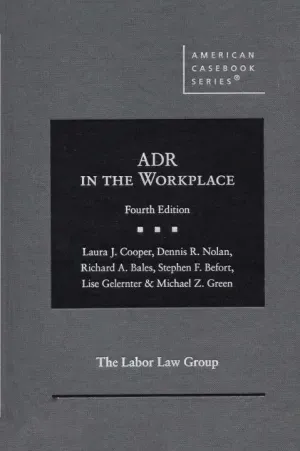ADR in the Workplace, Fourth Edition
Publication Date: April 13, 2020
ADR in the Workplace (West Academic, 4th ed. 2020) is the leading casebook on alternative dispute resolution (ADR) in labor and employment law. Authored by Laura J. Cooper, Dennis R. Nolan, Richard A. Bales, Stephen F. Befort, Lise Gelernter, and Michael Z. Green for The Labor Law Group, the book provides comprehensive coverage of labor arbitration, employment arbitration, mediation, and other ADR processes as they are applied in the modern workplace.
The volume is divided into three major parts. The first explores labor arbitration, tracing its historical development, the mechanics of grievance resolution, and the role of federal common law. It addresses core issues such as just cause discipline, management rights, past practice, and the duty of fair representation, with detailed treatment of both private- and public-sector arbitration. The second part turns to individual employment arbitration, focusing on the Federal Arbitration Act, the enforceability of arbitration agreements, and the growing prevalence of mandatory arbitration clauses and class action waivers. The third part examines mediation and other ADR mechanisms—including peer review systems, ombuds programs, and international approaches—while also addressing mediator ethics and the empirical decline of civil trials.
Throughout, the casebook blends judicial opinions, arbitral awards, statutory excerpts, and scholarly commentary. It integrates recent U.S. Supreme Court decisions, updated empirical studies, and contemporary controversies such as the Janus ruling on public-sector unions, executive orders narrowing federal-sector bargaining rights, and debates over fairness in employment arbitration. Notes, questions, and problems encourage critical engagement with the material, while appendices on arbitration brief writing help students develop practical advocacy skills.
As part of the American Casebook Series, ADR in the Workplace is designed for law schools, business schools, and industrial relations programs. Its modular structure allows instructors to adapt content for courses focused on labor arbitration, employment arbitration, or comparative approaches to workplace dispute resolution. Widely recognized for its balance of theory, doctrine, and practice, the book remains an essential resource for students, scholars, and practitioners seeking to understand how negotiation, mediation, and arbitration shape labor and employment disputes in the United States and beyond.


